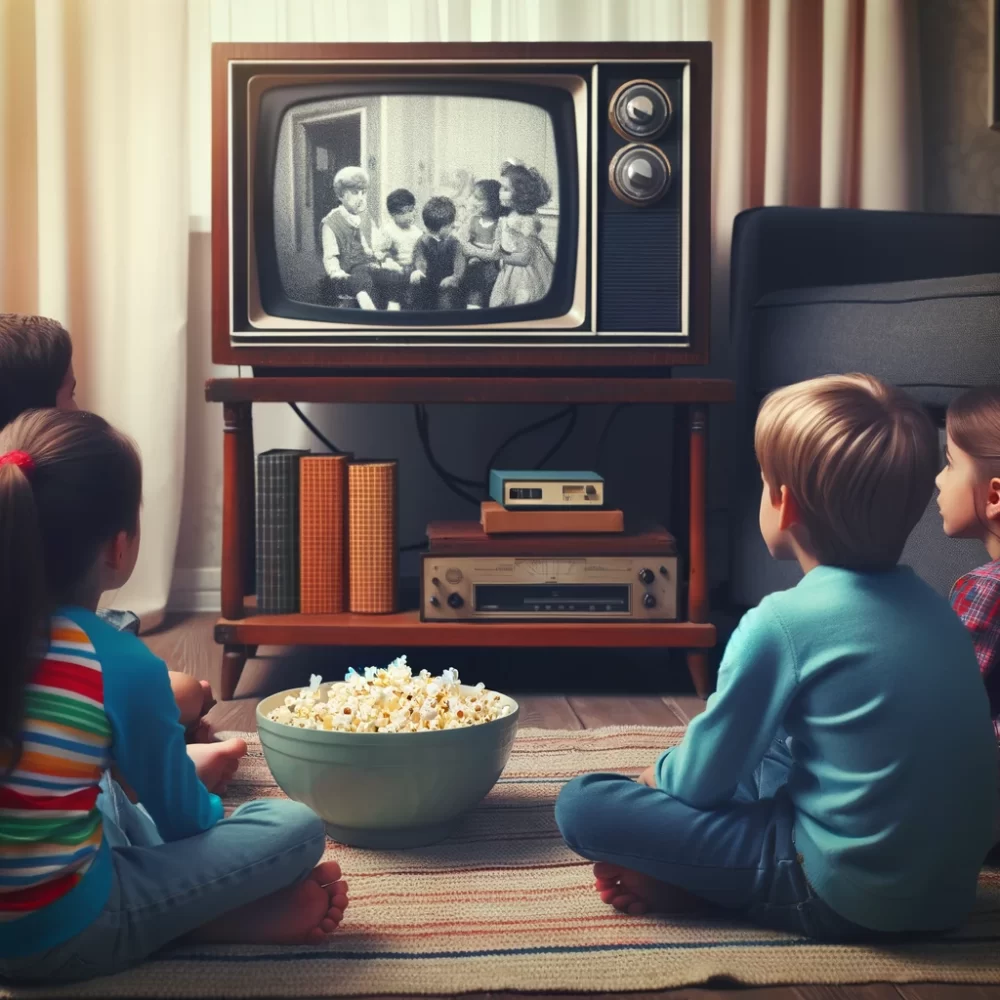
There are many rules that the children of previous generations had to endure. Some of the rules were fun and others were parent’s attempts to ensure their children were well-rounded, well-rested, and prepared for the world. Here are thirteen old-school parenting rules that Gen Z can’t fathom.
1. Limited Screen Time

In the past, parents strictly limited children’s screen time. This was done to encourage more physical activity and family interaction. Parents worried that too much TV would impair children’s social and cognitive development. Today, with the digital era in full swing, Gen Z finds this rule hard to understand. Screens are not just for entertainment but are tools for learning and creativity. The concept of only having a few hours a week for television or video games is almost unimaginable in an age where screens are an integral part of education and socialization.
2. Outdoor Play as a Daily Must

Previously, children were often told to play outside until dinner. This rule was seen as essential for physical health and fostering independence. Parents believed in the benefits of fresh air and unstructured play. This rule seems peculiar to many in Gen Z, who have grown up with a plethora of indoor entertainment options. The decline in outdoor play also reflects changing safety perceptions and urban lifestyles. The emphasis on outdoor play reflects a significant shift in how leisure time is spent by children today.
3. Limited and Monitored Friendships

Parents often had a strong say in their children’s choice of friends. In previous generations, it wasn’t uncommon for parents to heavily monitor and even restrict their children’s friendships. They might forbid friendships with children they deem as having a bad influence or from different socio-economic backgrounds. For Gen Z, growing up in an era celebrating diversity and personal freedom, the idea of parents dictating friendships could be quite alien. This practice reflects the more protective and controlled approach to parenting in the past, focusing on steering children’s social environments closely.
4. Addressing Adults By Their Title

Children addressing adults by titles and surnames was a must. In previous generations, it was common for children to address adults using Mr., Mrs., or Miss, followed by their surname, even within the family like referring to uncles and aunts formally. This rule, designed to instill respect for elders, seems quite formal to Gen Z. In modern times, first-name basis or more casual forms of address are common, reflecting a shift towards less hierarchical and more egalitarian family dynamics.
5. Strict Dress Codes

Dress codes used to be much stricter, both in schools and at home. This was believed to instill discipline and a sense of propriety. Uniforms and formal attire were commonplace in many settings. Since Gen Z’s are used to expressing themselves through a variety of clothing styles, this seems overly restrictive. This reflects broader cultural shifts towards individual expression and the acceptance of diverse personal styles.
6. Eating What’s Served or Going Hungry

The rule of “eat what’s on your plate or go hungry” was common. This was part of teaching children gratitude and preventing wastefulness. Parents viewed it as an important lesson in appreciating food. Gen Z, raised in an era of dietary awareness and choice, finds this rule difficult to comprehend, highlighting changing attitudes towards food and nutrition. Today, there’s a greater focus on accommodating individual dietary preferences and allergies.
7. Formal Family Dinners Every Sunday

Families had a tradition of formal dinners every Sunday. This practice was about maintaining family bonds and etiquette. Modern families, with their varied schedules and more casual dining habits, might find the formality and regularity of such gatherings unusual.
8. No Talking Back

Speaking up or questioning adults was often discouraged. This was part of a broader approach to discipline that valued obedience and respect for authority. Children were expected to listen and obey without question. This contrasts sharply with today’s emphasis on open communication and critical thinking, making this old-school rule puzzling to Gen Z. Modern parenting often encourages questioning and open dialogue, fostering independence and confidence.
9. Community Service as a Family Activity

Families often engaged in community service together. This was a method to instill social responsibility and teamwork. In the current era, while community service is still valued, it’s often pursued individually or through organized school activities, making the concept of family-based community work less common.
10. Mandatory Participation in Family Activities

Involvement in family activities was not optional, it was mandatory. Parents in previous generations often insisted that all family members participate in certain activities together, such as attending religious services, family gatherings, or even specific hobbies and interests. Personal preferences or desires for alone time were frequently secondary to the concept of family unity and tradition.
Gen Z is accustomed to a greater emphasis on individual choices and personal space, this compulsory participation in family activities might seem overly restrictive. This rule underscores the past focus on collective family experiences and the reinforcement of family bonds through shared activities.
11. No Locks on Bedroom Doors

Bedroom doors were kept lock-free to promote openness and monitoring. Privacy was not a priority. In stark contrast, Gen Z values personal space and privacy highly, making the concept of a lock-free bedroom quite unthinkable.
12. Earning Your Keep with Chores

Hard work was not just encouraged, it was expected. In many families, children were required to contribute significantly to household chores to earn their allowances or privileges. This might include tasks like chopping wood, tending to a home garden, or even helping with family businesses after school. For Gen Zs, who may be more accustomed to a balance of leisure and work in their routines, the idea of such intense household responsibilities could be surprising. It illustrates a past emphasis on instilling a strong work ethic from a young age.
13. Strict Bedtime Routines

Adherence to a strict bedtime routine was common. Parents of earlier generations often enforced very rigid bedtime schedules. Children were expected to be in bed at the same time every night, often quite early, and to follow a specific routine leading up to it, such as bathing, teeth brushing, and prayers or bedtime stories. This contrasts with the more flexible routines seen today, where bedtimes can vary and routines are often less structured. It highlights the past focus on discipline and routine in child-rearing.
Embrace the Change: How Parenting Has Evolved

As we marvel at these stark contrasts, it’s important to recognize the constant evolution of parenting styles. Every era brings its own challenges and innovations, shaping how children are raised. What seems outdated now was once the norm, and what we consider normal today might be obsolete for future generations. Understanding these changes can help bridge generational gaps and foster mutual respect.



